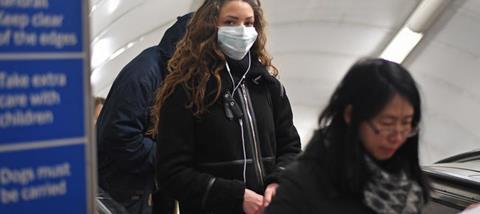
I must confess that there are moments when fear about coronavirus creeps over me. Being the kind of person I am – I regularly self-isolate from people with sick bugs – I easily become anxious about it. Some of the people who catch it could die. It could be a relative or friend. It could be me.
News is basically fact-based entertainment these days, and coronavirus (COVID-19) has taken over from Brexit as the big story. Tales of its spread have all the ingredients of a drama that we obsess over, consuming us with degrees of fascination and dread at each new episode.
I feel drawn towards finding comfort in the practical steps we are supposed to take to stop the virus spreading – wash your hands, keep your distance – and am consoled by the statistics that I am not in the high-risk category. But then what if…?
The symptoms of this new coronavirus include fever and respiratory symptoms such as coughing, sneezing and shortness of breath. The current evidence is that most cases appear to be mild but it has the potential, if it becomes widespread, to cause many deaths – perhaps 1 per cent of those infected. Compared to many global diseases or causes of death, it is currently pretty insignificant. However, unlike those other threats, this is the one we are all thinking about.
All this news is stoking people’s fear of the unknown, a fear of being out of control. Witness the news headlines and frenzied social media feeds, leading to almost daily school and workplace mass emails, face-to-face conversations about quarantine measures, social isolation and nations shutting their borders. One of the aisles at our local Sainsbury’s – normally full of every possible type of toilet roll – is completely empty.
Hand sanitiser has become the new gold currency. One UK manufacturer reports that they were producing 100,000 bottles a month in December and then went to 100,000 bottles per week in January. They are now attempting to produce 160,000 bottles per day! And they have run out of bottle caps.
In such an atmosphere as this, how should Christians think and respond?
Realism
This is a genuinely dangerous disease. We should not be in denial about its real potential to cause harm. We all know people whose immune systems are compromised and who are therefore at greater risk.
But we also know that illness is part of living in a fallen world and its threat is a real and daily reality for many people across the world. We do not want to get caught up in disproportionate, irrational panic, stoked by media hysteria; we must keep our heads in every situation.
Prayer
Because we know God cares for us and knows all about us, we can cry out to him with honesty about our fears and weaknesses. We know that God is kind and gracious and often preserves us from illness and death. We pray for protection for ourselves and our loved ones.
We also pray for those suffering the effects of this virus, especially our Christian brothers and sisters across the world and for any who are anxious about it, that they would find their hope and comfort in God.
But we should also pray that we might serve and love people in their fear and that God would be glorified. We ask God to be at work to bring many to realise the frailty of life and the need for real, lasting hope that is only found in Jesus Christ.
Faith, not fear
The temptation to fear coronavirus is real. God know this. This is why he says “do not fear” hundreds of times in the Bible.
This is an opportunity to exercise our faith – to show that our feet are planted on something as solid as rock. If being a Christian doesn’t mean something to us in the face of a deadly disease, then it doesn’t really mean anything. But it should make all the difference. As we read in Isaiah:
Do not call conspiracy
everything this people calls a conspiracy;
do not fear what they fear,
and do not dread it.
The Lord Almighty is the one you are to regard as holy,
he is the one you are to fear,
he is the one you are to dread. (Isaiah 8:12,13)
Christian blogger David Robertson recently wrote of the coronavirus: “The ‘worst-case scenario’ is not that 100 per cent of us get COVID-19 and 3.4 per cent die. The worst-case scenario would be if there were no Christ and no saviour. A far worse and more infectious virus is that of sin. 100 per cent of us are born with it. 100 per cent will die because of it. But we were created for eternity and that is why we fear death. The world’s answer is to panic and buy toilet paper. The church’s answer is to look to Christ.”
The confidence of our secular culture is all smoke and mirrors. The self-aware, casual irony of a culture that has never had its centre tested by anything is disappearing faster than loo rolls at the supermarket.
So we do not put our trust in the precautions we adopt or the projected low mortality rates. We trust our sovereign and gracious God. We need not fear but look to the Lord to provide, protect and teach us through these testing times.
Graham Nicholls is Director of Affinity
Premier Christianity is committed to publishing a variety of opinion pieces from across the UK Church. The views expressed on our blog do not necessarily represent those of the publisher.































